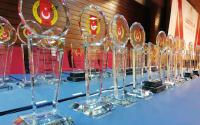Simon TisdallSaturday October 12, 2002 Who can stop Bush on Iraq? Not the UN security council, it seems, where US diplomatic kneecapping and punishment beatings proceed apace. Not an intimidated US Congress where, with honourable exceptions, the call to arms trumpets irresistibly over November's hustings. And not any number of international lawyers, vainly brandishing the UN charter and pre-emptively disregarded by high counsel to the White House hyperpower. In Whitehall, worried marchers scare pigeons but not the Pentagon. As the drum beats and the rhetoric rises, respected analysts opine that nothing now can prevent the war. Bush will have his way because, whatever bishops and imams vicariously preach, no power on earth can stop him.
This is not entirely true; in truth, not true at all. Americans can stop America's next war as they have stopped similar planned or actual idiocies in the past. That the Bush clique pays scant heed to Arab and Muslim concerns, has no time for "euro-wimps" and other appeasers is brutally clear. But domestic public opinion is a different story - and that story is changing. Slowly, inconsistently but palpably, ordinary Americans are making their voices heard. This is no anti-war movement to compare with Vietnam. Their motivations are often practical, even mundane. But a strange phenomenon is now apparent in which Karl Rove, Bush's top electoral strategist and poll-watcher, may yet emerge as a more potent force than the Cheney-Rumsfeld axis and all the other full-spectrum dominators combined.
Each time Bush ups the ante, makes another, ever more far-fetched, fearsome claim about the Baghdad bogeyman, domestic support wavers or slips. It certainly does not rise, as this week's Pew Center survey confirms. Far from uniting his nation, as he claims, Bush's demagoguery is discernibly exposing and deepening its divisions not just on Iraq but along the deep, still heaving faultlines of the 2000 election. More and more of the 76% of voters who did not support him then (he won 47% of the popular vote on a 51% turnout) find their judgment vindicated now. "The public is deeply split," says the Pew survey. Be sure that Rove is watching, with a weather eye to the 2004 election, even as the hawks fly high and blind.
Bush still enjoys considerable but softening overall support; his approval ratings are steadily declining. The latest month-on-month Gallup shows support for military action dropping towards 50% despite the vast weight of official propaganda reworking last year's still resonant trauma. If a unilateral war without allies or UN backing is postulated, as in this week's New York Times/CBS poll, a clear majority opposes Bush. Majorities also say Bush should allow UN weapons inspectors to return to Iraq, and they question his motives. These findings are hardly conclusive. But they suggest a trend, a rising level of distrust; they are reason to believe that Bush may yet be given pause.
That the anti-Bush, silenced majority feels it is being ignored by politicians and the mainstream media is abundantly clear from unsolicited American responses to a critique of this week's Cincinnati national address by Bush published on the Guardian's website* and on US links. This random sample also indicates rapidly rising anxiety, frustration and anger about Iraq, and Bush himself. Here, perhaps, the authentic voice of America may be heard.
"I have never seen so much bullshit thrown at the American public in my lifetime, with too many people thinking it may be true if the president says it," emails a 77-year-old from Manchester, New Hampshire. "We are being rail roaded into war over here. I am astounded by our president and his tactics utilising fear," says one writer. "When I voted for Bush I had no idea what he would unleash," says another. An Arizonan believes that Bush is "a complete and pathetic idiot ... I think enough Americans are beginning to see that the real regime change needs to take place at the White House". "The Bush presidency should have been nipped in the bud by the supreme court," writes an Illinois resident. "We've been bamboozled and Congress doesn't seem to know what to do." From Maryland comes the cry: "As an American I am totally speechless at whatever emanates from Bush's mouth - I mean, my 12-year-old son would make a better president." In New York, some feel the same way. "To attack with so little proof is ghastly ... As someone who smelled the World Trade Center and its human occupants burn every day for three months, I do not wish that fate on the long-suffering Iraqi people."
An emailer from Bush's Texas believes "all he is trying to do is divert attention from his failure as a leader ... under Bush we are giving up all our civil rights in the name of fighting the war on terror. If we do not agree with him, we are anti-American." A Californian agrees: "The American media shows complete indifference to ... the opinions of many if not most Americans (of whom) a majority are against this stupid adventure." "As an older American who loves her country, I am terrified," writes Katie Redd. "Younger Americans just do not seem to realise the dangers of this arrogant, stupid little man. I pray God will help us - because our main press glorifies him and few congressmen oppose him." A resident of lower Manhattan says Bush is beginning to sound like a "movie trailer for Creatures with an Atom Brain".
Indeed, Americans are far more scathing about Bush than supposedly anti-American Europeans. "Redneck pea-brain" is one epithet; "King George", "Lord High Executioner" and "imperialist" are others. "Insane" and "madman" crop up a lot. "Loony" says a psychiatrist from Ohio. "Corporate terrorist" says a vexed lady from Florida. There are voices from the other side, of course, enraged by foreign criticism. "Stupid, ignorant asshole ... Pathetic limey twit ... Islamofascist apologist ... Snotty eurotrash ... Parasitic appeasers ... When we want your opinion, we'll come over there and beat it out of you!" But the balance is 9-1 against.
Yet crucially, amid all this angst and ire, Iraq is not the big issue on American minds. All polls agree that the economy and jobs are the main concern. Up to 60% do not approve of Bush's economic stewardship; that figure is rising. Feeding in are worries about Enron-type corruption, the stock market plunge and dwindling personal saving accounts. Despite Bush's politics of fear, what Americans are really frightened of is deepening recession. And they rightly suspect that a costly Middle East war, oil shocks and spreading financial instability could make matters much, much worse. As Bill Clinton said, "It's the economy, stupid". In America, it always is. Here is the mortal gap in Bush's war armour. Here, in the prospect of following his father into one-term obloquy, is what could yet stop Bush on Iraq.
Americans worry about Iraq. They worry about their own country more. And Bush, not Saddam, is pig in the middle. "This man is destroying our nation piece by piece," writes Jewel from Missouri. "We, the unheard American public, pray that the world realises that we have a fool in charge and he does not speak for us."
*www.guardian.co.uk/worlddispatch[email protected]http://www.guardian.co.uk/comment/story/0,3604,810448,00.html






